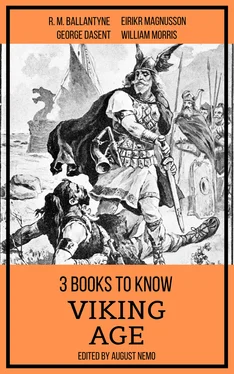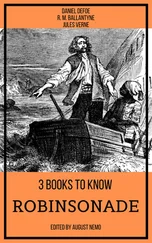1 ...6 7 8 10 11 12 ...39 At this Thorward turned on his heel and walked away in a towering passion.
It so happened that, on drawing near to Brattalid, he met Biarne coming in the opposite direction. Nothing could have pleased him better—for in the state of his mind at the time he would have turned savagely on himself, had that been possible, in order to relieve his feelings.
“So!” he cried, confronting Biarne, “well met! Tell me, Biarne, didst thou poison the ears of Freydissa by telling her that I had been courting thy cousin Astrid?”
Biarne, who was not aware of the consequences of what he had said in jest, felt inclined to laugh, but he checked himself and flushed somewhat, not being accustomed to be addressed in such haughty tones. Instead of explaining the matter, as he might otherwise have done, he merely said, “I did.”
“Liar!” exclaimed Thorward fiercely, for he was a very resolute man when roused; “go, tell her that the assertion was a falsehood. Go now, and come back to tell me thou hast done it, else will I chop thy carcase into mince-meat. Go; I will await thee here.”
He laid his hand upon his sword, but Biarne said quietly, “I go, sir;” and, turning round, hastened up to the hamlet.
Thorward could scarcely believe his eyes, for Biarne was fully as stout as himself, and somewhat taller, besides having the look of a courageous man. He had issued his imperative mandate more as a defiance and challenge than anything else, so that he gazed after the retreating Biarne with mingled feelings of surprise, contempt, and pity; but surprise predominated. He had not long to wait, however, for in about ten minutes Biarne returned.
“Well, have you told her?”
“I have,” replied Biarne.
“Hah!” exclaimed Thorward, very much perplexed, and not knowing what to say next.
“But, Thorward,” said Biarne, after a momentary pause, “methinks that you and I must fight now.”
“With all my heart,” answered Thorward, much relieved, and again grasping his sword.
“Nay, not with such weapons,” said Biarne, stepping up to him, “but with the weapons of friendship.”
With that he bestowed such a hearty buffet on Thorward’s left ear that it turned the irascible man head over heels, and laid him at full length on the sand.
Thorward rose slowly, being somewhat stunned, with a confused impression that there was something wrong with his head. Before he had quite recovered, Biarne burst into a laugh and seized him by the hand.
“Freydissa bids me tell you—” he said, and paused.
The pause was intentional. He saw that Thorward was on the point of snatching away his hand and returning the blow or drawing his sword; but he restrained himself in order to hear Freydissa’s message.
“She bids me tell you,” repeated Biarne, “that you are a goose.”
This was not calculated to soothe an angry man, but Thorward reflected that the epithet was figurative, and bore a peculiar signification when uttered by a woman; he therefore continued his self-restraint and waited for more.
“She also said,” added Biarne, “that she never for a moment believed my statement (which, by the way, was only made in jest), and that she thinks you deserve a good buffet on the ear for taking the thing up so hotly. Agreeing with her entirely in this, I have fulfilled her wish and given you your deserts. Moreover, she expects you to accompany her to Heriulfness to-night. So now,” said Biarne, releasing Thorward’s hand and touching his sword-hilt, “if you are still inclined—.”
“Well, well,” said Thorward, whose visage, while his friend was speaking, had undergone a series of contortions indicative of a wild conflict of feelings in his breast, “well, well, I am a goose, and deserved the buffet. After all, I did call you a liar, so we are quits, Biarne—tit for tat. Come, let us shake hands and go up to Leif’s cottage. You said Freydissa was there, I think.”
During that winter Karlsefin married Gudrid and Thorward Freydissa, and, in the following spring, they embarked in Karlsefin’s ship—with a large party of men, women, children, and cattle—and set sail for Vinland.
FREYDISSA SHOWS HER Temper and a Whale Checks it—Poetical and Other Touches.
––––––––

THE EXPEDITION WHICH now set out for Vinland was on a much larger scale than any of the expeditions which had preceded it. Biarne and Leif had acted the part of discoverers only—not colonisers—and although previous parties had passed several winters in Vinland, they had not intended to take up a permanent abode there—as was plain from the fact that they brought neither women nor flocks nor herds with them. Karlsefin, on the contrary, went forth fully equipped for colonisation.
His ship, as we have said, was a large one, with a decked poop and forecastle, fitted to brave the most tempestuous weather—at least as well fitted to do so as were the ships of Columbus—and capable of accommodating more than a hundred people. He took sixty men with him and five women, besides his own wife and Thorward’s. Thorward himself, and Biarne, accompanied the expedition, and also Olaf—to his inexpressible joy, but Leif preferred to remain at home, and promised to take good care of Thorward’s ship, which was left behind. Astrid was one of the five women who went with this expedition; the other four were Gunhild, Thora, Sigrid, and Bertha. Gunhild and Sigrid were wives to two of Biarne’s men. Thora was handmaiden to Gudrid; Bertha handmaid to Freydissa. Of all the women Bertha was the sweetest and most beautiful, and she was also very modest and good-tempered, which was a fortunate circumstance, because her mistress Freydissa had temper enough, as Biarne used to remark, for a dozen women. Biarne was fond of teasing Freydissa; but she liked Biarne, and sometimes took his pleasantries well—sometimes ill.
It was intended that, when the colony was fairly established, the ship should be sent back to Greenland to fetch more of the men’s wives and children.
A number of cattle, horses, and sheep were also carried on this occasion to Vinland. These were stowed in the waist or middle of the vessel, between the benches where the rowers sat when at work. The rowers did not labour much at sea, as the vessel was at most times able to advance under sail. During calms, however, and when going into creeks, or on landing—also in doubling capes when the wind was not suitable—the oars were of the greatest value. Karlsefin and the principal people slept under the high poop. A number of the men slept under the forecastle, and the rest lay in the waist near the cattle—sheltered from the weather by tents or awnings which were called tilts.
It may perhaps surprise some readers to learn that men could venture in such vessels to cross the northern seas from Norway to Iceland, and thence to Greenland; but it is not so surprising when we consider the small size of the vessels in which Columbus afterwards crossed the Atlantic in safety, and when we reflect that those Norsemen had been long accustomed, in such vessels, to traverse the ocean around the coasts of Europe in all directions—round the shores of Britain, up the Baltic, away to the Faroe Islands, and up the Mediterranean even as far as the Black Sea. In short, the Norsemen of old were magnificent seamen, and there can be no question that much of the ultimate success of Britain on the sea is due, not only to our insular position, but also to the insufficiently appreciated fact that the blood of the hardy and adventurous vikings of Norway still flows in our veins.
It was a splendid spring morning when Karlsefin hoisted his white-and-blue sail, and dropped down Ericsfiord with a favouring breeze, while Leif and his people stood on the stone jetty at Brattalid, and waved hats and shawls to their departing friends.
Читать дальше













